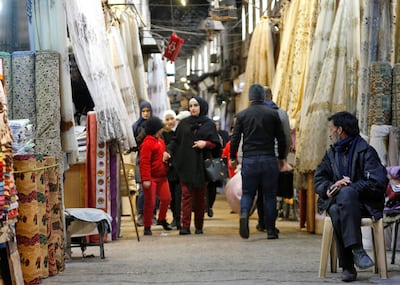A Syrian militia leader who is a distant cousin of Bashar Al Assad has admonished the President’s traditional supporters for their criticism of deteriorating living standards.
The rebuke by Waseem Al Assad came as the Syrian pound sank to new lows against the dollar, with some loyalists blaming the leadership.
“Go work the land, and not do videos and sit-ins and this nonsense,” Waseem Al Assad said in a video statement on his Facebook page on Saturday.
Those unhappy with the malaise must avoid tying it to the ruling Baath Party and the security apparatus, he said.
“They gave their blood on your behalf,” said Waseem Al Assad.
His outburst indicates unease among Syria’s ruling elite about increased frustration among the Alawite sect – to which the President and his family belong.
Economic decline and growing lawlessness have fuelled disquiet.
Writer Lama Abbas last week blamed “the leadership” directly for the economic crisis, and specifically mentioned the Baath Party.
When secret police moved against Ms Abbas, another Alawite figure called intelligence agents “cowards”.
الرجاء المشاركة
Posted by وسيم الاسد on Saturday, July 29, 2023
'Regime strongman'
Waseem Al Assad has been seen as a junior member of the Assad clan who amassed a fortune in the war over the past decade, displacing more established family members.
His militia is mostly active in the Latakia coastal mountain region, a stronghold of the President’s minority Alawite sect, and operates in Sunni areas taken over by Shiite Iraqi militias supported by Iran in eastern Syria.
He is subject to US and other western sanctions. The British government describes him as a “strongman for the Syrian regime, who facilitates the manufacturing and smuggling” of the amphetamine Captagon.
Damascus unrest
In the social media post, Waseem Al Assad appeared to threaten those he claims are fomenting unrest.
“Don’t sow sedition. I am one of the people who knows … what the capabilities of the government are,” he said.
This was an apparent reference to recent unrest in the southern Damascus suburb of Jaramana, which has been hard hit by the economic crisis.
Street gunfights erupted and shopfronts were smashed in the violence, which reportedly occurred after a member of the Druze community in the area was wounded by a gunshot and Palestinian refugee residents of Jaramana were blamed.
Refugees have fled to the suburb over the past 13 years from other districts in and around the capital that were overrun by the Syrian military in the civil war.
“You think we can control the dollar exchange rate?” Waseem Al Assad asked.
“Instead of helping the state you pressure it. Shame on you.”
The Syrian pound is trading at about 13,000 to the US dollar, compared with 8,500 in May, when Damascus was readmitted to the Arab League and hopes among Bashar Al Assad’s supporters rose that regional investment would pour in.

On the eve of the Syrian uprising against Assad family rule in 2011, the Syrian pound was trading at about 50 to the dollar.
By the end of that year, Syria was embroiled in civil war after the authorities used violence to put down the protest movement.
In recent days, security agents reportedly entered the home of Ms Abbas on the outskirts of Damascus. She was not arrested after her children confronted the agents.
Last week, Ms Abbas had said in a video post that the system has failed.
“The government, parliament, officials, ministers and the leadership – all have proven their failure, with distinction,” Ms Abbas said.
“The education system has collapsed. It is corrupt. The judiciary is corrupt. Everything else has become corrupt.”
Regime discontent
Among the people who came to her defence was Bashar Barhoum, an Alawite satirist.
Describing security officers who went to her home as “cowards”, he called the Baath Party a traitor group.
Veteran Syrian political analyst Ayman Abdel Nour said the recent social media videos “shows how bad the situation is – even in core regime areas”.
But Mr Abdel Nour said “the loyalists are worn out from [being on] the inside”.
This severely limits their ability to come up with an alternative to Bashar Al Assad, he said.
The Baath Party took power in a 1963 coup, mounted by mainly Alawite officers.
In 1970, Syrian Air Force commander Hafez Al Assad, the father of Bashar Al Assad, led another coup and appointed himself the country's leader.







